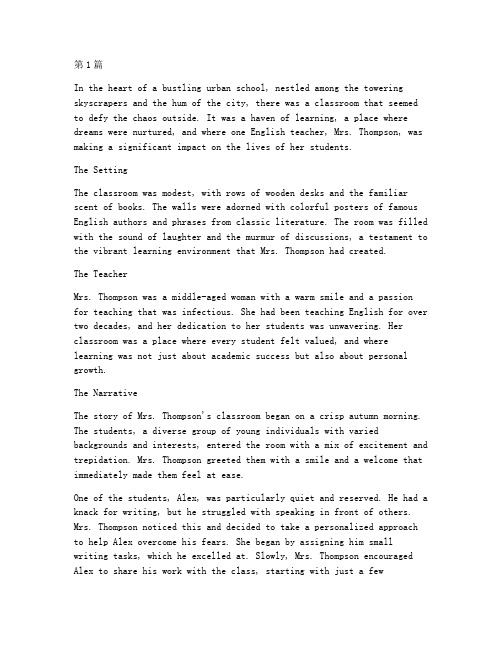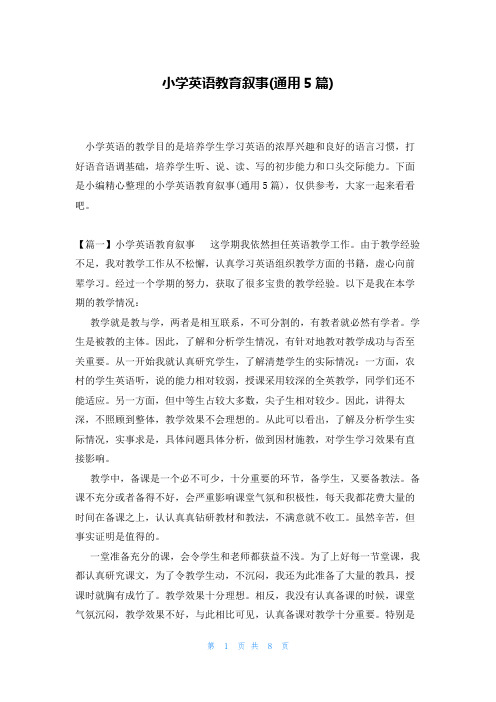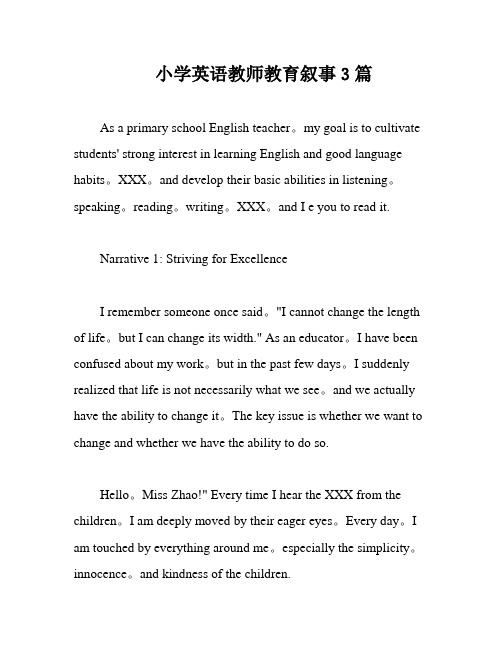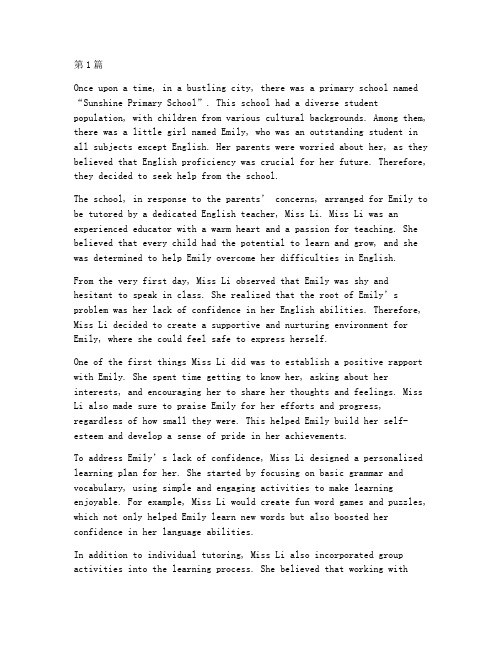英语教学叙事案例
小学英语教育叙事范文3篇

小学英语教育叙事范文3篇英语教育中存在许多困难,但是我们可以通过探索和实践找到规律,让英语教育更加顺利。
《英语课程标准》提出了培养学生研究兴趣的重要性,让学生变成研究的主人。
因此,小学英语教学需要有趣味性,吸引学生的兴趣。
在我的教学中,我设计了一些活动,以活跃课堂气氛、提高课堂效率。
第一种活动是听、说、做。
例如,在教数字时,我让学生用英语数数,同时拿出小棒,这样既玩了,又复了数字。
在教身体部位时,我让学生做Touch游戏,边做动作,边说身体部位名称,既锻炼了听力,又加深了记忆。
第二种活动是演、说、唱。
表演是研究语言的有效途径,小学生更有表现欲望。
在教小动物时,我让学生抓住每种小动物的特征,边读单词边做动作,边找相应的单词卡片,整个课堂就像是一个动物园。
在教学中,我也会适时地教一些英语歌曲,调动学生研究英语的积极性,增强记忆,活跃气氛。
第三种活动是听、说、画。
这种活动可以让学生通过画图来巩固所学的知识,加深记忆。
This method XXX' XXX English words with corresponding images in their minds。
XXX words。
For example。
whenlearning words that XXX such as hot。
cold。
rainy。
and windy。
guide students to use simple drawings to represent the meanings of the words。
For instance。
XXX。
carrying an XXX。
XXX branch represents windy。
wearing sunglasses represents sunny。
carrying an XXX。
etc。
Therefore。
XXX force for primary school students to love learning and be proficient in learning English。
教育叙事案例英语老师(2篇)

第1篇In the heart of a bustling urban school, nestled among the towering skyscrapers and the hum of the city, there was a classroom that seemed to defy the chaos outside. It was a haven of learning, a place where dreams were nurtured, and where one English teacher, Mrs. Thompson, was making a significant impact on the lives of her students.The SettingThe classroom was modest, with rows of wooden desks and the familiar scent of books. The walls were adorned with colorful posters of famous English authors and phrases from classic literature. The room was filled with the sound of laughter and the murmur of discussions, a testament to the vibrant learning environment that Mrs. Thompson had created.The TeacherMrs. Thompson was a middle-aged woman with a warm smile and a passionfor teaching that was infectious. She had been teaching English for over two decades, and her dedication to her students was unwavering. Her classroom was a place where every student felt valued, and where learning was not just about academic success but also about personal growth.The NarrativeThe story of Mrs. Thompson's classroom began on a crisp autumn morning. The students, a diverse group of young individuals with varied backgrounds and interests, entered the room with a mix of excitement and trepidation. Mrs. Thompson greeted them with a smile and a welcome that immediately made them feel at ease.One of the students, Alex, was particularly quiet and reserved. He had a knack for writing, but he struggled with speaking in front of others. Mrs. Thompson noticed this and decided to take a personalized approach to help Alex overcome his fears. She began by assigning him smallwriting tasks, which he excelled at. Slowly, Mrs. Thompson encouraged Alex to share his work with the class, starting with just a fewsentences at a time. With each success, Alex's confidence grew, and his voice began to resonate more loudly in the classroom.Another student, Maria, was a visual learner. Traditional teaching methods often left her feeling disconnected from the material. Mrs. Thompson recognized this and started incorporating more visual aids into her lessons. She used diagrams, videos, and interactive whiteboards to make complex concepts more accessible to Maria. This not only helped Maria but also made the lessons more engaging for the entire class.One day, the class was studying Shakespeare's "Romeo and Juliet." Mrs. Thompson knew that many students found the language and themes of the play challenging. Instead of simply reading through the play, she decided to bring the story to life. She organized a Shakespearean play, allowing students to take on roles and perform scenes from the play. The excitement in the classroom was palpable as students prepared for the performance. The day of the play arrived, and the school hall was filled with the sound of a live performance. The students were not just actors but also directors, set designers, and stage managers. The experience was transformative for everyone involved, and it brought Shakespeare's timeless story to life in a way that no textbook could.As the year progressed, Mrs. Thompson's classroom became a place where students not only learned English but also learned about themselves. They discovered their strengths, faced their fears, and grew as individuals. Mrs. Thompson's teaching style was not just about imparting knowledge but about fostering a love for learning and a sense of community.The ImpactThe impact of Mrs. Thompson's teaching extended beyond the classroom. Students who had once struggled with English found their voices and gained confidence. They began to see the value of literature and the power of language. Alex, who had once been too shy to speak, delivered a powerful monologue in the school play. Maria, who had previously avoided group work, became an active participant in class discussions.The success of Mrs. Thompson's approach was not limited to individual students. The class as a whole demonstrated significant improvement in their understanding of English literature and their writing skills. Mrs. Thompson's passion for teaching had created a ripple effect that touched every student in the room.ConclusionThe case of Mrs. Thompson, the English teacher, is a powerful testament to the transformative power of education. Her commitment to her students, her innovative teaching methods, and her ability to create a supportive and inclusive learning environment are qualities that any educator would do well to emulate. In a world that is ever-changing, Mrs. Thompson's classroom stands as a beacon of hope, a place where students can dream, grow, and learn.第2篇In the heart of a bustling urban school, there exists a classroom where the world of words and sentences come alive. This is the classroom of Mrs. Johnson, an English teacher with a passion for literature and a heart full of compassion. This narrative explores the transformative journey of a student, Alex, and the profound impact Mrs. Johnson's dedication and innovative teaching methods had on his learning experience.BackgroundAlex, a 14-year-old boy, entered Mrs. Johnson's English class with a mixture of apprehension and curiosity. He had struggled with English for years, often feeling disconnected from the subject matter. His previous teachers had used a traditional, teacher-centered approach, where the focus was on rote memorization and passive learning. Alex's grades in English were consistently below average, and he had begun to dread the weekly classes.The First EncounterOn the first day of the semester, Mrs. Johnson greeted her students with a warm smile and an open mind. She introduced herself and her expectations for the course, emphasizing the importance of critical thinking and creative expression. Instead of launching into atraditional lesson, she asked her students to share their favorite books and why they enjoyed them. Alex, initially hesitant, found himself sharing about a science fiction novel that had captured his imagination.Mrs. Johnson listened intently, nodding and encouraging each student. She then announced that the course would be a journey through various genres of literature, with a focus on how authors use language to convey emotions, ideas, and experiences. She promised that each student would have the opportunity to explore texts that resonated with them personally.The Transformative ProcessAs the semester progressed, Mrs. Johnson's approach began to have a profound effect on Alex. She encouraged active learning by creating a classroom environment that was both supportive and challenging. Here are some key moments that illustrate the transformative process:1. Personalized Learning: Mrs. Johnson recognized that each student had unique strengths and weaknesses. She tailored her lessons to accommodate different learning styles, allowing Alex to engage with the material in ways that were meaningful to him. For instance, she provided him with additional resources on grammar and vocabulary, helping him build asolid foundation.2. Interactive Discussions: Mrs. Johnson facilitated lively class discussions, where students were encouraged to express their opinions and ask questions. Alex found himself participating more actively, not only because he was interested in the texts but also because he felt valued and respected in the classroom.3. Creative Assignments: Instead of traditional essays and quizzes, Mrs. Johnson assigned creative projects that allowed students to express themselves in different ways. Alex thrived on these assignments, writingpoetry inspired by the characters and themes of the books they studied. His writing improved significantly, and he began to take pride in his work.4. Peer Collaboration: Mrs. Johnson encouraged peer collaboration, which helped Alex to learn from his classmates and feel less isolated. He developed strong relationships with his peers, and together, they supported each other in their learning journey.5. Reflective Writing: At the end of each unit, Mrs. Johnson had students write reflective essays on the texts they had studied. This practice allowed Alex to connect the literature to his own life experiences, fostering a deeper understanding and appreciation of the material.The OutcomeBy the end of the semester, Alex's transformation was evident. His grades in English soared, and he developed a genuine love for the subject. He no longer dreaded English class but looked forward to it, eager to engage with new texts and share his thoughts with his classmates. Mrs. Johnson's innovative teaching methods had not only improved Alex's academic performance but also instilled in him alifelong love of reading and writing.ReflectionMrs. Johnson's story serves as a powerful reminder of the impact that dedicated teachers can have on their students. By adopting a student-centered approach, she was able to tap into Alex's interests and strengths, transforming his learning experience from a source of dread to a source of joy. This case study highlights the importance of personalized learning, interactive discussions, creative assignments, peer collaboration, and reflective writing in fostering a love for learning.In conclusion, Mrs. Johnson's dedication and innovative teaching methods played a crucial role in Alex's educational journey. Her approach not only improved his academic performance but also instilled in him apassion for literature that would undoubtedly serve him well in the future. This narrative is a testament to the power of education and the transformative potential of a caring and dedicated teacher.。
初中英语教育叙事范文

初中英语教育叙事范文
初中英语教育是培养学生语言能力的重要阶段。
以下是一个相
关的叙事范文示例:
故事题目:我的英语研究之旅
故事内容:
我在初中时期开始了我的英语研究之旅。
一开始,我对英语并
不感兴趣,觉得研究起来很枯燥无味。
但是,我的英语老师非常有
趣和激励,她教我们用有趣的游戏和互动的方式研究英语,让我开
始渐渐爱上了这门语言。
在我课余时间,我积极参加各种英语角和英语俱乐部的活动。
通过和其他同学一起交流和练,我不仅提高了我的口语能力,也拓
展了我的词汇量。
同时,我还通过英语阅读来提升我的阅读理解能力,并逐渐培养了阅读英文小说的惯。
我的英语研究之旅也充满了挑战和困难。
有时候,我会遇到一
些难以理解的语法规则和单词拼写。
但是,我通过请教老师和同学,
以及利用各种研究资源,逐渐克服了这些困难。
我学到了坚持不懈和不怕失败的重要性,这使我更加自信面对英语研究的挑战。
随着时间的推移,我发现我在英语研究中的进步越来越快。
我在英语考试中取得了好成绩,也能够和外国朋友进行基本的交流。
这使我对自己的能力更加有信心,并且对将来的英语研究充满了期待。
通过初中英语教育,我不仅学会了一门语言,更重要的是培养了我研究的兴趣和能力。
我相信,英语研究将在我的未来道路上扮演重要的角色。
以上就是我初中英语学习之旅的叙事范文。
希望能够给大家带来一些启发和参考。
小学英语教育叙事(通用5篇)

小学英语教育叙事(通用5篇)小学英语的教学目的是培养学生学习英语的浓厚兴趣和良好的语言习惯,打好语音语调基础,培养学生听、说、读、写的初步能力和口头交际能力。
下面是小编精心整理的小学英语教育叙事(通用5篇),仅供参考,大家一起来看看吧。
【篇一】小学英语教育叙事这学期我依然担任英语教学工作。
由于教学经验不足,我对教学工作从不松懈,认真学习英语组织教学方面的书籍,虚心向前辈学习。
经过一个学期的努力,获取了很多宝贵的教学经验。
以下是我在本学期的教学情况:教学就是教与学,两者是相互联系,不可分割的,有教者就必然有学者。
学生是被教的主体。
因此,了解和分析学生情况,有针对地教对教学成功与否至关重要。
从一开始我就认真研究学生,了解清楚学生的实际情况:一方面,农村的学生英语听,说的能力相对较弱,授课采用较深的全英教学,同学们还不能适应。
另一方面,但中等生占较大多数,尖子生相对较少。
因此,讲得太深,不照顾到整体,教学效果不会理想的。
从此可以看出,了解及分析学生实际情况,实事求是,具体问题具体分析,做到因材施教,对学生学习效果有直接影响。
教学中,备课是一个必不可少,十分重要的环节,备学生,又要备教法。
备课不充分或者备得不好,会严重影响课堂气氛和积极性,每天我都花费大量的时间在备课之上,认认真真钻研教材和教法,不满意就不收工。
虽然辛苦,但事实证明是值得的。
一堂准备充分的课,会令学生和老师都获益不浅。
为了上好每一节堂课,我都认真研究课文,为了令教学生动,不沉闷,我还为此准备了大量的教具,授课时就胸有成竹了。
教学效果十分理想。
相反,我没有认真备课的时候,课堂气氛沉闷,教学效果不好,与此相比可见,认真备课对教学十分重要。
特别是对英语这门学生不甚熟悉并感到困难的外语来说至关重要。
备课充分,能调动学生的积极性,上课效果就好。
但同时又要有驾驭课堂的能力,因为学生在课堂上的一举一动都会直接影响课堂教学。
上课内容丰富,现实。
教态自然,讲课生动,难易适中照顾全部,就自然能够吸引住学生。
小学英语教师教育叙事3篇

小学英语教师教育叙事3篇As a primary school English teacher。
my goal is to cultivate students' strong interest in learning English and good language habits。
XXX。
and develop their basic abilities in listening。
speaking。
reading。
writing。
XXX。
and I e you to read it.Narrative 1: Striving for ExcellenceI remember someone once said。
"I cannot change the length of life。
but I can change its width." As an educator。
I have been confused about my work。
but in the past few days。
I suddenly realized that life is not necessarily what we see。
and we actually have the ability to change it。
The key issue is whether we want to change and whether we have the ability to do so.Hello。
Miss Zhao!" Every time I hear the XXX from the children。
I am deeply moved by their eager eyes。
Every day。
I am touched by everything around me。
especially the simplicity。
英语教育叙事范文(精选6篇)

英语教育叙事范文(精选6篇)英语教育叙事范文第1篇英语教育叙事范文第5篇英语作为学生学习的第二语言,有着与其他学科不同的特殊性。
从学科本身来讲,课堂上出现各种意外事件的频率比较高,再加上农村学生的学习行为习惯相对差些,所以能否较为妥善地处理好突发事件就显的尤为重要。
俗话说的好“猝然临之而不惊,无故加之而不怒。
” 只有“沉着”,才能“应战”,才能将被动局面扭转。
一次在快要上完一节还算满意的课后,一个学生突然举手示意。
原本以为他要提出针对本课的疑问,没想到是向我告状。
告状的内容是他身旁的小李同学偷偷地看了大半节课的课外书。
因为他坐的是最角落的位置加之我在平时有不许学生在课堂上随便告状的规定,所以始终曾未发现。
正当这时下课铃声响起,为了不耽误给其他学生布置作业,我只说了句:“下课后,小明同学帮我把录音机提到办公室去。
”在回办公室的路上,我一边走在他身旁,一边和他进行了这样的对话:“上课看的是什么书啊?”小李:“《马丁的早晨》。
” “哦,那这书讲的是什么故事啊?”小明:“一个叫马丁的魔术师的故事。
”“哦?他会变魔术?变什么呢?”小明:“变很多种人。
”“那具体说说啊。
”他开始莫不做声,估计在努力回想,但似乎因为语言组织能力不是很好,没有立刻回答,这时也恰好走到了办公室。
让他放下录音机后我问:“你这节课共看了几页呢?”小明翻了翻书说:“好几十页。
”我说:“不错呢,一节课可以看那么多。
如果你一节课能学那么多知识该有多好啊(自言自语),那你在课上有听到我讲了些什么吗?”小明:“ruler。
” (以前的旧知识,在这节课中运用于新旧知识的结合环节)我又接着说:“不错,一心能二用,边看书边还可以听课,说明你脑袋不赖啊。
”小明不好意思地低下了头。
我立刻又问:“那你能用英语说说这尺是什么颜色的吗?”(颜色是这节课的新授内容)小明不是很自信地回答:“red?” 我竖起拇指表扬道:“Very good!”(接着便拿出了另外几种颜色的词语卡片,如我所料有大部分都读不出,我便反复耐心地教,耐心的纠正)不到5分钟,那孩子已经掌握的差不多了。
英语教育叙事案例 (2)

英语教育叙事案例故事题目:改变的力量故事梗概:这是一个关于一位名为杰克的英语教育工作者的故事。
杰克从大学毕业后,他来到一所小城市的学校担任英语教师。
然而,这所学校的教学水平相对较低,学生们对英语学习缺乏兴趣和动力。
在这样的环境中,杰克遇到了许多挑战,但他决定尝试改变这种状况。
故事情节:1. 杰克到达学校的第一天,他发现学生们对英语课程没有兴趣。
他们只是机械地背诵单词和文法,而没有实际运用的机会。
他决定改变教学方法来激发学生的兴趣。
2. 杰克组织了一次英语角活动,邀请学生们自由交流,分享自己的想法和经历。
这个活动获得了学生们的积极参与,他们愿意用英语表达自己的观点。
3. 杰克引入了一些互动的教学方法,例如学生们通过小组合作解决问题,角色扮演以及有趣的游戏。
这样的教学方法使学生们更积极主动地参与课堂。
4. 在课堂外,杰克鼓励学生们每天都阅读英文文章或故事,并组织了一次读书分享会。
学生们展示了他们的阅读成果,分享着他们喜欢的书籍及阅读心得。
5. 通过这些改变,学生们对英语学习的兴趣逐渐增加。
他们开始自己主动学习英语,找到自己的学习方法,并且取得了进步。
学生们的英语成绩也逐渐提高。
6. 不仅学生们受益于这些改变,整个学校的英语教学水平也得到了提升。
学校也成为了文化交流的平台,接待了许多国际交流项目。
7. 杰克在学校获得了教育界的认可,他的教学方法也被其他教师借鉴和应用。
他感到非常自豪,因为他看到了他的努力和改变所带来的积极影响。
结尾:通过杰克的努力,这所学校的英语教育水平得到了提高,学生们的学习兴趣和动力也得到了激发。
这个故事展示了英语教育中改变的力量,以及教师的重要作用。
杰克不仅在教育上发挥了积极的作用,同时也改变了学生们的一生。
英语教育案例_叙事(3篇)

第1篇Once upon a time, in a bustling city, there was a primary school named “Sunshine Primary School”. This school had a diverse student population, with children from various cultural backgrounds. Among them, there was a little girl named Emily, who was an outstanding student in all subjects except English. Her parents were worried about her, as they believed that English proficiency was crucial for her future. Therefore, they decided to seek help from the school.The school, in response to the parents’ c oncerns, arranged for Emily to be tutored by a dedicated English teacher, Miss Li. Miss Li was an experienced educator with a warm heart and a passion for teaching. She believed that every child had the potential to learn and grow, and she was determined to help Emily overcome her difficulties in English.From the very first day, Miss Li observed that Emily was shy andhesitant to speak in class. She realized that the root of Emily’s problem was her lack of confidence in her English abilities. Therefore, Miss Li decided to create a supportive and nurturing environment for Emily, where she could feel safe to express herself.One of the first things Miss Li did was to establish a positive rapport with Emily. She spent time getting to know her, asking about her interests, and encouraging her to share her thoughts and feelings. Miss Li also made sure to praise Emily for her efforts and progress, regardless of how small they were. This helped Emily build her self-esteem and develop a sense of pride in her achievements.To address Emily’s lack of confidence, Miss Li designed a personalized learning plan for her. She started by focusing on basic grammar and vocabulary, using simple and engaging activities to make learning enjoyable. For example, Miss Li would create fun word games and puzzles, which not only helped Emily learn new words but also boosted her confidence in her language abilities.In addition to individual tutoring, Miss Li also incorporated group activities into the learning process. She believed that working withpeers could provide Emily with opportunities to practice her English and learn from others. For instance, Miss Li organized group discussions, where students were encouraged to share their thoughts and opinions on various topics. Emily gradually became more comfortable speaking infront of her classmates, and her confidence grew.Another crucial aspect of Miss Li’s teaching approach was to make learning relevant to Emily’s life. She incorporated real-life scenarios into her lessons, such as writing letters to friends, making shopping lists, and reading stories about everyday situations. This helped Emily see the value of English in her daily life and motivated her to continue learning.To further enhance Emily’s language skills, Miss Li also intr oduced her to a variety of English resources, such as children’s books, songs, and videos. She encouraged Emily to read, listen, and watch these materials at home, which helped her develop a natural interest in the language.As time went by, Emily’s progre ss was remarkable. She became more confident in her English abilities, and her grades in the subject improved significantly. Her parents were overjoyed to see their daughter’s transformation and expressed their gratitude to Miss Li for her dedication and patience.One day, during a class presentation, Emily stood confidently in frontof her classmates and delivered a fluent speech. Her words were clear, her expressions were expressive, and her confidence was palpable. The entire class was captivated by her performance, and the teacher, Miss Li, couldn’t help but feel a sense of pride and accomplishment.Emily’s journey of growth in English education was not only a testament to her own hard work and determination but also a reflection of MissLi’s teaching me thods and dedication. Through personalized attention, supportive environment, and engaging activities, Miss Li helped Emily overcome her fears and develop a love for the English language.This narrative highlights the importance of tailored education, where every child is recognized for their unique strengths and challenges. Itdemonstrates that with the right guidance and support, even the most hesitant and struggling students can achieve remarkable progress. Emily’s story serves as an inspiration to educa tors and parents alike, reminding us that every child has the potential to succeed, given the right opportunities and a little bit of love.第2篇In the bustling city of Shanghai, amidst the towering skyscrapers and the constant hum of urban life, there lies a small, cozy classroom where a group of eager students gather each day to learn English. This narrative is about one such student, Xiao Ming, and the transformative journey he undergoes under the guidance of his dedicated teacher, Ms. Wang.Background:Xiao Ming, a 12-year-old boy with a bright smile and a curious mind, had always been a bit of a slow learner. While his classmates excelled in their English studies, Xiao Ming found himself struggling with the language. His pronunciation was off, his vocabulary was limited, and he often felt frustrated and overwhelmed. His parents, eager to help, enrolled him in a reputable English language school, hoping that professional instruction would make a difference.The Teacher's Approach:Ms. Wang, a seasoned educator with a warm smile and a wealth of experience, noticed Xiao Ming's struggle right away. Instead of immediately diving into intensive grammar drills or extensive reading assignments, she took a moment to get to know him. She engaged in conversations with him about his interests, asking him questions about his favorite books, movies, and sports. Through these conversations, Ms. Wang discovered that Xiao Ming was a fan of comic books and soccer.Armed with this newfound knowledge, Ms. Wang decided to take a different approach. She believed that to truly learn a language, students needed to be engaged and motivated. She began incorporating Xiao Ming'sinterests into his lessons, using comic book characters and soccer-themed vocabulary to make English learning fun and relevant.The Journey Begins:One day, Ms. Wang introduced a new activity in class. She handed out sheets of paper and colored pencils to the students and asked them to draw their favorite comic book characters. Xiao Ming was thrilled. He drew his favorite superhero, Spider-Man, with meticulous detail, even including the iconic web pattern on his costume.After drawing, Ms. Wang asked the students to write a short description of their characters in English. Xiao Ming hesitated at first, but with a bit of encouragement from Ms. Wang, he began to write. He described Spider-Man's powers, his costume, and his mission to protect the city. As he wrote, Xiao Ming's confidence grew. He was amazed at how much he could express himself in English, even though he had never written a story before.The next week, Ms. Wang decided to take the activity a step further. She asked the students to create their own comic strips, using the characters they had drawn and the descriptions they had written. Xiao Ming was excited. He paired up with a friend and together they crafted a story about Spider-Man saving a kitten from a tree. They worked diligently, drawing the panels, writing the dialogue, and even creating their own comic book style.As the project progressed, Xiao Ming's English improved dramatically. His vocabulary expanded, his grammar became more accurate, and his pronunciation became clearer. More importantly, his confidence soared. He no longer felt like a slow learner; he felt like a writer and a creator.The Turning Point:One day, Ms. Wang decided to hold a small exhibition of the students' comic strips. She invited parents, teachers, and fellow students to come and view the art and read the stories. Xiao Ming was nervous, but he also felt a sense of pride. When his parents arrived, they were amazedat the progress he had made. They watched as Xiao Ming confidently presented his comic strip to the audience, explaining the story and the characters.After the exhibition, Xiao Ming's classmates approached him, complimenting his work and asking for tips on how to improve their own English. Xiao Ming was delighted to share his experiences and encourage others. He realized that his journey was not just about learning English; it was about discovering his own creativity and potential.Conclusion:The story of Xiao Ming and Ms. Wang is a testament to the power of patience, creativity, and understanding in the realm of English language education. By taking the time to get to know her students and incorporating their interests into her lessons, Ms. Wang was able toturn Xiao Ming's struggle into a triumph. Her approach highlights the importance of making learning fun, relevant, and engaging, thereby fostering a love for the language and a sense of accomplishment.In the end, Xiao Ming's journey was not just about mastering English; it was about discovering the strength within himself and the joy of expression. And that, perhaps, is the true essence of education.第3篇IntroductionIn the vibrant city of Shanghai, China, there exists a primary school known for its innovative approach to education. Among the diverse range of students, there was a particular class, Class 3B, which had a unique set of challenges and triumphs. This narrative is centered around a student named Xiao Ming, who exemplifies the power of patience, engagement, and the transformative impact of English language education.The SettingClass 3B was a mixed-ability class with students ranging from native Chinese speakers to those who had just started learning English. The teacher, Ms. Wang, was known for her creative and student-centeredteaching methods. She believed that every student had the potential to excel, and it was her role to nurture that potential.The ChallengeXiao Ming was a quiet, reserved boy who often seemed lost in his own world. His English skills were basic, and he often avoided participating in class discussions. His parents were worried, as they saw their son struggling with a subject that was becoming increasingly important in their rapidly globalizing world.The InterventionMs. Wang noticed Xiao Ming's disengagement and decided to take a personalized approach. She began by having one-on-one conversations with him to understand his fears and concerns about learning English. Xiao Ming revealed that he felt embarrassed about his pronunciation and feared making mistakes in front of his peers.Armed with this knowledge, Ms. Wang designed a tailored intervention plan. She introduced Xiao Ming to the concept of 'gradual exposure' to English, starting with simple songs and rhymes that emphasized pronunciation and rhythm. She also encouraged Xiao Ming to participatein small group activities where he felt more comfortable and could build confidence.The JourneyOver the next few months, Xiao Ming's transformation was gradual yet profound. Ms. Wang used a variety of techniques to keep him engaged:1. Interactive Stories: Xiao Ming loved listening to stories. Ms. Wang started reading English stories to the class, and she noticed that Xiao Ming would sit up straighter, his eyes wide with curiosity.2. Role-Playing: Ms. Wang created scenarios where Xiao Ming could act out simple dialogues. Initially, he was hesitant, but with gentle encouragement, he began to participate more actively.3. Reward System: Xiao Ming was given small rewards for his efforts, such as stickers or extra playtime. These rewards were symbolic, emphasizing the value of his progress rather than material gain.4. Patience and Understanding: Ms. Wang was patient with Xiao Ming's mistakes, often pointing out the positive aspects of his responsesrather than focusing on the errors. This helped build his confidence.The TriumphOne day, during a class activity, Xiao Ming surprised everyone. He confidently stepped up to the front of the class and recited a poem in English, his pronunciation clearer and his confidence shining through. The class erupted in applause, and Xiao Ming beamed with pride.Since then, Xiao Ming has become an active participant in class discussions. He has started reading English books on his own and has even formed a small group with other students who share his passion for English.ReflectionThe case of Xiao Ming is a testament to the power of patience, engagement, and personalized teaching methods in English language education. Ms. Wang's approach highlighted several key principles:1. Understanding the Student: Knowing Xiao Ming's fears and concerns allowed Ms. Wang to tailor her teaching methods to his needs.2. Gradual Exposure: Starting with simple, achievable tasks helped Xiao Ming build confidence and gradually improve his skills.3. Engagement: Using interactive and fun activities kept Xiao Ming interested and motivated.4. Patience and Support: Ms. Wang's unwavering support and understanding allowed Xiao Ming to overcome his fears and embrace the learning process.ConclusionThe narrative of Xiao Ming's journey in English language education serves as an inspiration to educators and parents alike. It underscores the importance of recognizing each student's unique strengths and challenges and the power of a supportive and engaging learning environment. Through patience, creativity, and understanding, even the most hesitant learners can transform into confident and enthusiastic participants in the world of English.。
- 1、下载文档前请自行甄别文档内容的完整性,平台不提供额外的编辑、内容补充、找答案等附加服务。
- 2、"仅部分预览"的文档,不可在线预览部分如存在完整性等问题,可反馈申请退款(可完整预览的文档不适用该条件!)。
- 3、如文档侵犯您的权益,请联系客服反馈,我们会尽快为您处理(人工客服工作时间:9:00-18:30)。
英语教学叙事案例
英语作为学生学习的第二语言,有着与其他学科不同的特殊性。
从学科本身来讲,课堂上出现各种意外事件的频率比较高,再加上农村学生的学习行为习惯相对差些,所以能否较为妥善地处理好突发事件就显的尤为重要。
俗话说的好“猝然临之而不惊,无故加之而不怒。
” 只有“沉着”,才能“应战”,才能将被动局面扭转。
一次在快要上完一节还算满意的课后,一个学生突然举手示意。
原本以为他要提出针对本课的疑问,没想到是向我告状。
告状的内容是他身旁的小李同学偷偷地看了大半节课的课外书。
因为他坐的是最角落的位置加之我在平时有不许学生在课堂上随便告状的规定,所以始终曾未发现。
正当这时下课铃声响起,为了不耽误给其他学生布置作业,我只说了句:“下课后,小李同学帮我把录音机提到办公室去。
”在回办公室的路上,我一边走在他身旁,一边和他进行了这样的对话:“上课看的是什么书啊?”小李:“《马丁的早晨》。
” “哦,那这书讲的是什么故事啊?”小李:“一个叫马丁的魔术师的故事。
”“哦?他会变魔术?变什么呢?”小李:“变很多种人。
”“那具体说说啊。
”他开始莫不做声,估计在努力回想,但似乎因为语言组织能力不是很好,没有立刻回答,这时也恰好走到了办公室。
让他放下录音机后我问:“你这节课共看了几页呢?”小李翻了翻书说:“好几十页。
”我说:“不错呢,一节课可以看那么多。
如果你一节课能学那么多知识该有多好啊(自言自语),那你在课上有听到我讲了些什么吗?”小李:“ruler。
” (以前的旧知识,在这节课中运用于新旧知识的结合环节)我又接着说:“不错,一心能二用,边看书边还可以听课,说明你脑袋不赖啊。
”小李不好意思地低下了头。
我立刻又问:“那你能用英语说说这尺是什么颜色的吗?”(颜色是这节课的新授内容)小李不是很自信地回答:“red?” 我竖起拇指表扬道:“Very good!”(接着便拿出了另外几种颜色的词语卡片,如我所料有大部分都读不出,我便反复耐心地教,耐心的纠正)不到5分钟,那孩子已经掌握的差不多了。
我又问:“你觉得那书好看吗?”小李有些不太明白意思地点了点头。
我说:“说明你是看的懂那本书的,对吗?”小李回答:“是。
”“那如果你没有很好的语文基础,能看懂里面的内容吗?”小李摇了摇头。
“你知道吗?如果你英语学好了,能看懂更多更有趣的书呢。
想看吗?”小李说:“想。
”“那以后上课...... ”小李没等我说完就说:“我会认真听讲的。
”我点着头鼓励他:“好,我会在上课时看着你的表现的,别让我失望哦!”“嗯。
”
从那次事情后,我在上课时就格外注意起像小李那样虽然聪明但注意力不容易长时间集中的孩子来,有时候因为喉咙疼,还回请他们来帮我做布置作业的小话筒(我轻声向他们传达作业内容,让他们大声向全班同学宣布),发现他们在上课时的表现比以前有了很大的进步,而且我上课也更有效率了。
卡尔·罗杰斯有句名言:一旦真诚、对个人的尊重、理解学生的内心世界等态度出现了,振奋人心的事情就发生了。
爱学生就要尊重学生,尊重学生的人格,理解
学生的要求和想法,理解他们的幼稚和天真;用充满爱的眼睛欣赏学生……即使是成绩最差,行为最随便的孩子,他们也有自尊,也要我们所说的“面子”。
很多课堂上的突发事情其实并不需要立刻处理,如果留到课后,给学生和自己的思想一片天空,让谈话沟通给彼此的心灵一个自由,那么我想教与学就将不再是心血来潮和灵感突发的过程了。
我上面提到的例子,是很平常、很普通的事情。
我们做教师的几乎每个人都能够遇到,但要真能够做到恰如其分,得心应手,却也不是那么容易,就我本人来讲,在平时很多的教学过程中就犯过不少错误。
解决一系列的问题除了自身的素质之外,仍然需要一个长期的过程。
通过自身的努力,加上对于教育事业的热爱,加上对自己所教学生的深厚的爱,我想我会把这种应对此类“突发事件”的能力提升为一门教育艺术的。
